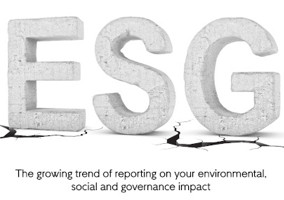With organisations under “heavier scrutiny than ever before,” it is vital that charities report on environmental, social and governance (ESG) matters, RSM has said.
As charities exist for public benefit, if accountability for ESG “fall[s] below society’s expectations” supporters will “readily move on”, the finance firm has warned.
Nick Sladden, head of charities at RSM, said: “It’s not much use if you’re a charity that does a lot of good if, for example, that same charity is a significant polluter.”
Sladden was joined by Carys Tetlaw, senior consultant at RSM to speak at Civil Society Media’s ESG Imperative event yesterday.
They discussed the findings from RSM's new report, What Does ESG Mean for the Charity Sector?, which analysed 114 charities' annual accounts.
Key findings
None of the charities surveyed had a strategy specifically labelled under ESG, whilst most corporate organisations do.
However, just under a quarter (23%) of charities did include a section referencing activity that aligned to ESG reporting.
Only 17% of charities' annual accounts included streamlined energy and carbon reporting. Some 14% of charities surveyed had a specific webpage dedicated to ESG.
Charities did score relatively well on the governance aspect of ESG, with a third having adopted a governance code.
Charities are expected to act on ESG
The report finds charities have a “head start” when it comes to ESG, as the purpose of a charity is to provide public benefit and cause no harm to the environment – so it already aligns with most charitable objectives.
Sladden said: “This is becoming a wider responsibility for us all. We cannot ignore the obligation to act on climate change.”
He then went on to discuss how charities can create an ESG strategy.
“In order to start from scratch with your ESG strategy you need to know where you are,” Sladden said.
His colleague, Tetlaw, added: “ESG needs to be bespoke for what your operations are.”
She gave the example of working from home not being the automatically most environmentally-friendly option, as it depends on how many people are sharing an energy supply in that household. In some cases, it might be more efficient to work from an office.
How do you create an ESG strategy?
Sladden outlined seven steps charities could take to create an effective ESG strategy:
- Working group – charities should assemble a working group dedicated to ESG reporting which tracks the charity’s actions. This should be made up of the best-suited people and include a senior leader, they advised.
- Self-assessment – a charity should conduct a self-assessment on what they are currently doing that aligns with ESG reporting.
- Where do you want to be? – outline how your charity wants to improve on ESG reporting.
- Board endorsement – discuss these new ideas with the board.
- Partner collaboration – enhanced ESG reporting could open opportunities for more partner collaborations that have a natural fit with your cause, Sladden said.
- Report to stakeholders – ensure your stakeholders know your position on the matters.
- Continuous involvement – Sladden emphasised that ESG is a journey that will not happen overnight.
Sladden closed the session with a call to action. He said: “The charity sector should be proud of the efforts they have made to date reporting on ESG, however we shouldn’t be complacent. ESG is evolving rapidly so it’s vital to stay up to date and abreast of any new regulations.”
RSM plans to repeat the research in a year to 18 months’ time.
Related articles












